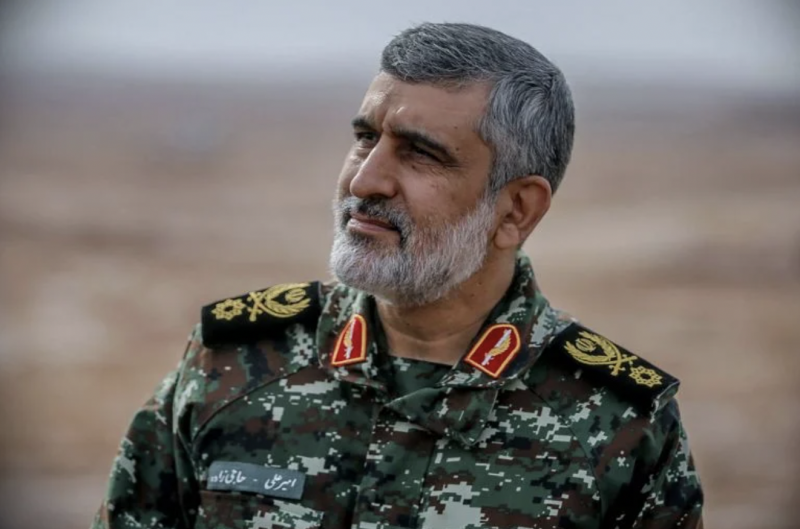
Amir Ali Hajizadeh, commander of Iran's Revolutionary Guard aerospace force. (Credit: AFP)
Amir Ali Hajizadeh, head of Iran’s ballistic missile program, assumed a key role in the implementation of Iran’s response on Saturday evening. He took center stage with the unprecedented attack that involved hundreds of drones and missiles fired toward Israel.
Hajizadeh is the commander of the Islamic Revolutionary Guard Corps’s Aerospace Force (IRGC-AF). This post earned him the confidence of the Supreme Leader, Ayatollah Ali Khamenei, since 2009 and enabled the continued development of Iran’s military air capabilities.
‘Ready for all scenarios’
A hardliner, Hajizadeh has seemingly been preparing for this operation for a long time. In 2016, when Iran tested its Qadr missile, he said, “The reason why we designed our missiles with a 2,000 km range is to be able to hit our enemy, the Zionist regime, from a safe distance.”
Recently, Hajizadeh was filmed smiling when the Supreme Guide promised to avenge the Israeli attack in the Syrian capital, which killed a senior IRGC official.
Since the start of the war in Gaza, and while Israeli strikes on Iran’s interests in the region intensified, Hajizadeh has stepped up his hardline statements. In November, he warned that the war in the enclave risked spreading across the region, insisting that “Tehran is ready for all scenarios.”
While these bellicose statements are widely circulated, little is known about the man himself.
Hajizadeh was born in 1961 in Tehran, to parents from Karaj, a suburb of the capital. After the outbreak of the Iran-Iraq war (1980-1988), the young graduate in management joined the IRGC as a sniper in the artillery division.
Hajizadeh joined the IRGC-AF in 1985 (the year it was created) under the protection of Hassan Tehrani Moghaddam, who was appointed commander of the missile program in 1983 and nicknamed “the father of Iranian missiles.”
A year later, he traveled to North Korea with an IRGC delegation as part of a technological exchange key for developing the first Shahab-3 missiles. This took place when Iran was at its lowest level of military self-sufficiency.
Empowerment strategy
Faced with increasingly acute international isolation due to Western sanctions, the desire for autonomy has become a basic principle of Iran’s aerospace strategy. It was initiated by the Supreme Guide, emphasizing the importance of strengthening local capabilities.
Tehran launched its cruise missile program in the 1990s, which has been constantly evolving ever since. The release of the Shahab-3B ballistic missile in 2003 — a pillar of Iran’s strategic deterrence, which has a range of up to 2,100 kilometers — paved the way for producing longer-range missiles.
In 2009, Hajizadeh led the 15,000-strong Pasdaran Air Force and was behind the restructuring of this military corps. Under his leadership, it evolved into a veritable aerospace force, even integrating a major space program and developing satellite launchers.
By 2013, this development had enabled Iran to be ranked sixth worldwide in missile production. Hajizadeh said publicly in March 2016 that there were no technical or conventional limitations on the missile range. His threats were realized in June 2021 when the Commander-in-Chief of the IRGC Hossein Salami said that Iran now had drones capable of flying 7,000 km and countering air defense.
In November, Tehran unveiled the Fattah II hypersonic missile, which it claims can travel at over 18,000 km/h while maneuvering to evade anti-ballistic defenses.
Observers believe that Iran now has the largest missile arsenal in the Middle East.
This article was originally published in L'Orient-Le Jour. Translated by Joelle El Khoury.